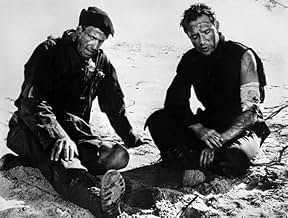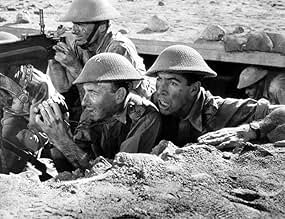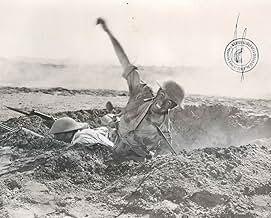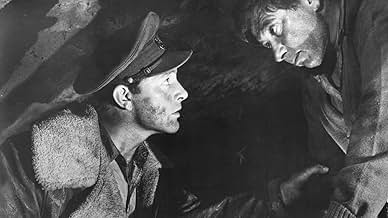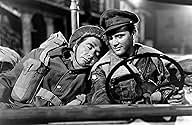Richard Burton plays a Scottish Army officer put in charge of a disparate band of ANZAC troops on the perimeter of Tobruk with the German Army doing their best to dislodge them.Richard Burton plays a Scottish Army officer put in charge of a disparate band of ANZAC troops on the perimeter of Tobruk with the German Army doing their best to dislodge them.Richard Burton plays a Scottish Army officer put in charge of a disparate band of ANZAC troops on the perimeter of Tobruk with the German Army doing their best to dislodge them.
- Nominated for 1 Oscar
- 1 win & 1 nomination total
- Lt. Harry Carstairs
- (as Charles Tingwell)
- English Officer
- (uncredited)
- Corporal
- (uncredited)
- British Officer
- (uncredited)
- Sergeant
- (uncredited)
- German Lieutenant
- (uncredited)
- German Gunner
- (uncredited)
- German Radio Man
- (uncredited)
- German Orderly
- (uncredited)
- Colonel
- (uncredited)
- Director
- Writer
- All cast & crew
- Production, box office & more at IMDbPro
Featured reviews
Despite it's age, most of the attempts at special effects (artillery in the distance, explosions done via matte) come off well. As for the scenes where they really shoot off some pyrotechnics, they spared no expense! The overall portrait of the desert and army life looks very real and has the ring of truth. The plot is exciting and never drags.
The only problems are the over-patriotic script (I guess we should cut them some slack here, this movie was made much closer to the war than we are today!) and as noted elsewhere, the inappropriate German weapons. It's amazing that they used Thompson machine guns instead of MP40's, when for the next 30 years everybody from "The Man from U.N.C.L.E." to James Bond would use the MP40 all over the place. In summary I think this movie was a bit better than I expected and holds up well to repeated viewings.
In 1941 British and Australian troops had control of the fortress town of Tobruk in Libya. Tobruk gets surrounded by German and Italian troops as the Axis tries to take Egypt and the Suez Canal. The British high command order the Australian General Leslie Morshead to hold Tobruk for 2 months to disrupt the German supply lines. Morshead was a clever commander, trapping German tanks to make them useless and made his troops fight a tough guerrilla campaign. The main focus of the film is on a British officer, 'Tammy' MacRoberts who is given command of a fresh batch of Australian troops, including his former school master. He has to train his troops to get them ready for the battle and first the bitter war.
The acting isn't that good, the Australian accents were awful and it would have been easier if their casted Australian actors. As well their seem to be an American officer with the British and Australians ones, I don't know why? What makes the film work is the war scenes. They are well done and you get to feel the action and sweat of battle. The film is also a short, tort experience. Also there is an historical inaccuracy; the Desert Rats was the name for the 9th Armoured Division of the British Army, not the 7th Australian Army. However Rommel did call the army the rats of Tobruk.
Personally I would like to see a new film about the war in North Africa because their are many interesting stories and battles, from the Battle of El-Alamein, the story of Rommel and Montgomery, Operation Touch, the Birth of the SAS, etc... The Siege of Tobruk would also make an interesting story for a modern film.
Although the story has neither the forced authenticity of 'The Longest Day' or the Hollywood panache of 'Where Eagles Dare' I believe it still manages to stand out in a special place on its own. Prior to a host of many other war movies it was the first to concentrate exclusively on the common soldier in the trenches, his anxieties for the present and hopes for the future. I also liked the side story of the young captain who is surprised to have under his command a favourite old school master, Bartlett played by Robert Newton. It causes some quizzical looks amongst the men, especially when he insists on continuing to address the old private as sir. Here the Desert Fox is played with dignity and respect by James Mason. The other german characters are also portrayed benignly, perhaps in view of the fact that very few atrocities were committed by Rommel's troops unlike their counterparts in Eastern Europe. History records accurately what eventually happened to Rommel in the aftermath of the plot to assassinate Hitler but here that is all in the near future. I recommend this b & w film to all war movie buffs of this English made genre but if you're looking for 'Saving Private Ryan' perhaps you should give it a miss.
They have always had a reputation as an informal people and it's with a bit of surprise that spit and polish Scots officer Richard Burton is put in charge of a batallion in a forward area of the defense perimeter surrounding Tobruk. The men and Burton don't take to each other too readily, but gradually the troops grow to respect Burton as a courageous fighting man.
Burton as it happens gets a bit of assistance from an unexpected quarter. His old schoolmaster Robert Newton had immigrated to Australia and enlisted in their army at the start of World War II. When not focusing on the battle sequences, The Desert Rats is about the relationship between Burton and Newton. All the rules about army discipline and separation of officers and enlisted men go by the boards here. Burton who's been under a strain like everyone else under siege at Tobruk gets a safety valve in Newton. An old friend from the past, a father figure if you will, gives Burton someone he can confide his innermost thoughts and fears to.
Sad to say the alcoholic Mr. Newton gives a refrained and dignified performance as a middle aged alcoholic schoolmaster. A role he could understand all too well from real life. He complements Burton's performance every step of the way in this film.
Look for some good performances from Australian actors Charles Tingwell and Chips Rafferty. Though this is a film about the Allied forces at Tobruk in 1941 and no Americans were officially fighting, this is an American production. So these two guys made their American cinema debuts. Tingwell never made another American film, but Rafferty came back a few times and his presence makes every film he's in just a bit better.
You might recognize Michael Rennie's voice doing the offscreen narration for The Desert Rats. The Desert Rats is a timeless wartime classic about the strain of command at every level of the Armed Services.
Did you know
- TriviaThe film was banned in Egypt, as the British were still occupying the Suez Canal and the Sudan.
- GoofsDuring the raid on the German camp there is a sign on a building reading "Hauptquartiers". Although the English word "Headquarters" might suggest a plural s, in German there doesn't exist such a form. The correct word would be "Hauptquartier" and the plural "Hauptquartiere"
- Quotes
Tom Bartlett: You don't know much about real fear, Tammy. Maybe it comes with age or the bottle. You don't know what it is to be a coward... really a coward. To know it, yet to hope one day something will happen to prove that you're not, yet half the time not really believing that either.
- Crazy creditsOpening credits prologue: 1941 LIBYAN DESERT NORTH AFRICA
- ConnectionsEdited into La guerre, la musique, Hollywood et nous... (1976)
- SoundtracksWaltzing Matilda
(1895) (uncredited)
Original music by Christina Macpherson (1895)
(Based on the Scottish tune "Craigielee", music by James Barr, with words by Robert Tannahill)
Revised music by Marie Cowan (1903)
Lyrics by A.B. 'Banjo' Paterson (1895)
Played during the opening credits and often in the score
- How long is The Desert Rats?Powered by Alexa
Details
Box office
- Budget
- $1,320,000 (estimated)
- Runtime1 hour 28 minutes
- Color
- Aspect ratio
- 1.37 : 1
Contribute to this page



